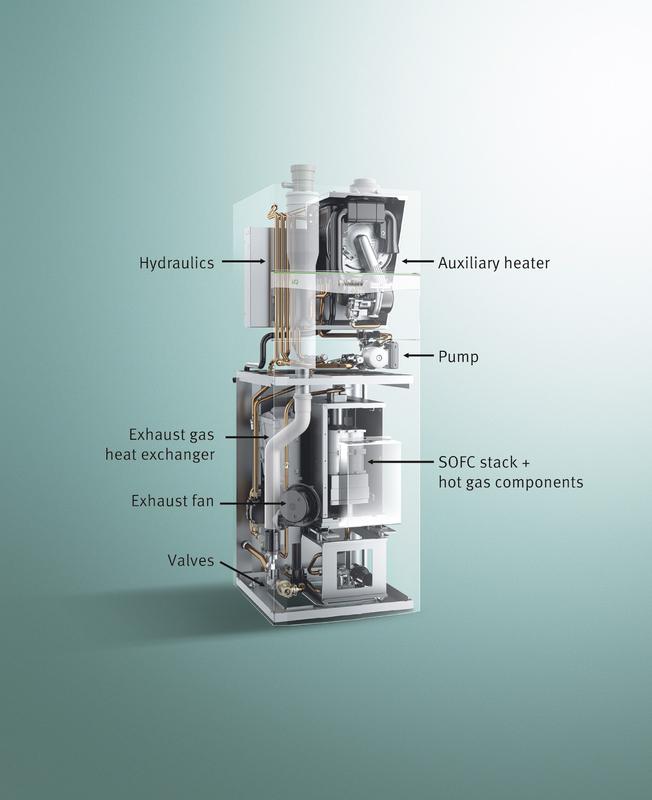Robust fuel cell heating unit developed

Layout of the current XellPower fc-heater with the fuel cell system at the bottom and the gas condensing boiler above. © Vaillant GmbH
Mini-CHP plant provides electricity and heat for single-family homes
The device provides an electrical output of 0.7 kW and a thermal output of 1.3 kW. A standard gas condensing unit is integrated to cover peak heating demands.
The overall efficiency is over 90%. All components are compactly arranged in a casing.
The negative pressure prevailing within the casing provides an effective safety concept to counter the risk of undetected gas leaks.
Previous devices were mostly based on overpressure. With the new unit, the developers have succeeded in halving the production and installation costs compared with previous systems.
The fuel cell heating device was tested in practice as part of the Callux energy research field trials, which involved devices from different manufacturers.
Fuel cells can be operated with natural gas or with hydrogen and methane generated from renewable energies or biomass.
The new fuel cell heating unit has been developed by Vaillant GmbH in collaboration with partners from research and industry.
You found all informations about the BINE Projektinfo brochure entitled “Fuel cell generates electricity and heat for homes” here:
http://www.bine.info/en/press/press-releases/press/pressemitteilung/robustes-bre…
Uwe Milles/Birgit Schneider
presse(at)bine.info
About BINE Information Service
Energy research for practical applications
The BINE Information Service reports on energy research topics, such as new materials, systems and components, as well as innovative concepts and methods. The knowledge gained is incorporated into the implementation of new technologies in practice, because first-rate information provides a basis for pioneering decisions, whether in the planning of energy-optimised buildings, increasing the efficiency of industrial processes, or integrating renewable energy sources into existing systems.
About FIZ Karlsruhe
FIZ Karlsruhe – Leibniz Institute for Information Infrastructure is a not-for-profit organization with the public mission to make sci-tech information from all over the world publicly available and to provide related services in order to support the national and international transfer of knowledge and the promotion of innovation.
Our business areas:
• STN International – the world’s leading online service for research and patent information in science and technology
• KnowEsis – innovative eScience solutions to support the process of research in all its stages, and throughout all scientific disciplines
• Databases and Information Services – Databases and science portals in mathematics, computer science, crystallography, chemistry, and energy technology
FIZ Karlsruhe is a member of the Leibniz Association (WGL) which consists of 87 German research and infrastructure institutions.
http://www.bine.info/en – BINE Informationsdienst
Media Contact
More Information:
http://www.fiz-karlsruhe.deAll latest news from the category: Power and Electrical Engineering
This topic covers issues related to energy generation, conversion, transportation and consumption and how the industry is addressing the challenge of energy efficiency in general.
innovations-report provides in-depth and informative reports and articles on subjects ranging from wind energy, fuel cell technology, solar energy, geothermal energy, petroleum, gas, nuclear engineering, alternative energy and energy efficiency to fusion, hydrogen and superconductor technologies.
Newest articles

Properties of new materials for microchips
… can now be measured well. Reseachers of Delft University of Technology demonstrated measuring performance properties of ultrathin silicon membranes. Making ever smaller and more powerful chips requires new ultrathin…

Floating solar’s potential
… to support sustainable development by addressing climate, water, and energy goals holistically. A new study published this week in Nature Energy raises the potential for floating solar photovoltaics (FPV)…

Skyrmions move at record speeds
… a step towards the computing of the future. An international research team led by scientists from the CNRS1 has discovered that the magnetic nanobubbles2 known as skyrmions can be…





















